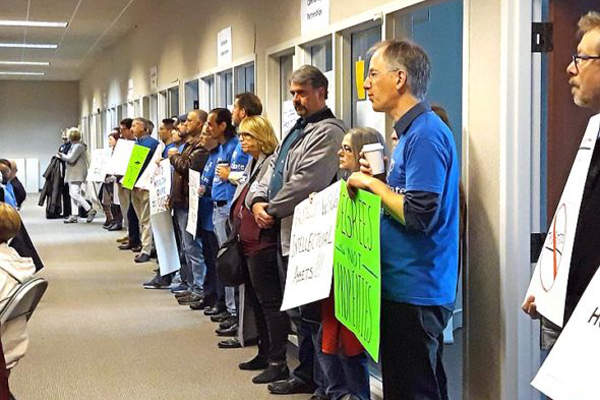
Excerpt from the Dayton Daily News
Any deal on a contract for Wright State University’s faculty union won’t come until next year, meaning the group will have worked for around 18 months without a new agreement in place.
No more board meetings are scheduled to discuss collective bargaining this year and Martin Kich, president of the Wright State Chapter of the Association of American University Professors, said he doesn’t expect much progress to be made until 2019.
“We wouldn’t expect it until next year,” Kich said.
Reaching a contract agreement is the “biggest challenge” Wright State faces going into 2019, said board of trustees chairman Doug Fecher.
The Story So Far
Then: The WSU faculty union’s contract expired in June 2017 and members have threatened to strike if a deal is not reached.
Now: The union has been working without a new contract for 18 months and one isn’t expected to be reached before the end of the year.
Next: A deal could be reached some time in 2019 or union members could strike if the adminsitration imposes a last, best offer.
Contract talks first stalled in March 2017 when then-president David Hopkins abruptly resigned just a few months before his retirement. Although the union contract expired in June, an agreement with the administration means the expired contract remains in place until a new one is reached.
Since then, a fact-finder’s report released in October called for no pay raises, the possibility of furloughs and increased health care costs while dismissing the idea of downsizing Wright State’s athletics department. The board of trustees voted to accept the report while union members overwhelmingly rejected it in a vote of 467-12.The union has threatened to strike if the administration “imposes” a last, best offer at some point, Kich said. But both Kich and Fecher have said they hope to avoid a strike.
“We would love to get the collective bargaining agreement put into place in a way that everyone can live with,” Fecher said.
Tensions between the Wright State administration, board and faculty union reached a boiling point last month when some faculty senate members called for a vote of no confidence in president Cheryl Schrader. Such a vote could be months away due to faculty senate procedures.
Schrader said the push for a confidence vote likely stemmed from ongoing contract negotiations.
“I think everybody’s ready to wrap things up and move on,” she said. “I would certainly hope that’s something that we can put aside.”
Kich agreed, saying the vote is a sign that the longer-than-expected negotiations are “wearing on people.”
After a year in which Schrader and her administration had to deal with multiple crises, Kich said the contract dispute is a “lingering reminder” of the problems Wright State has faced in recent years.
Wright State reduced its spending last year by around $53 million, and the school was under federal investigation for more than three years for its misuse of H-1B visas. Schrader recently announced that WSU will avoid being placed on fiscal watch status by the state, and the board reached a $1 million non-prosecution agreement with the U.S. Attorney’s Office to end the federal probe.
“It just doesn’t make sense to not sit down to come up with an agreement that the two sides could at least live with,” Kich said. “I never expected this was going to happen.”

